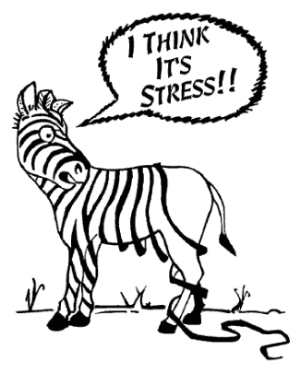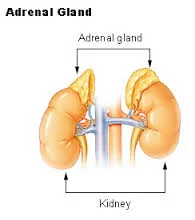During the darker months, we are meant to rest more, but that rarely happens. You may have long hours at work, wee ones running around or even a new puppy keeping you up (like a few people I know!). All of these run you down and you may feel like you cannot climb out of the hole. Fear not my fellow zombies, there is a reason behind your fatigue and ways to fix it.
What is Adrenal Fatigue?
A simple explanation is that you body can't produce enough cortisol, your stress hormone, to keep up with your daily stressors. Therefore, adrenal fatigue is caused by too much stress! There are two portions to your nervous system, the sympathetic, or "fight and flight" response, and the parasympathetic, or "rest and digest" response. Our bodies prefer to be in "rest and digest" the majority of the time, and only "fight and flight" when needed, such as running away from something or pumping you up for a presentation. These days, people are experiencing the opposite! We have too many stressors and we are not giving ourselves the proper time to relax. Your adrenal glands, which sit on top of your kidneys, then have to work on overdrive to produce enough stress hormone to cope...which then runs out!
Signs of Adrenal Fatigue:
There are several common signs that your stress glands has been working overtime.
- I get dizzy when standing up rapidly.
- I have chronic fatigue, and rely on stimulants.
- I am groggy in the morning, and have trouble getting out of bed.
- I have trouble getting to sleep.
- My muscles feel weak.
- My allergies are getting worse, and I have multiple sensitivities.
- My skin is more reactive lately.
- I frequently feel colder than others.
- The term "hangry" rings true for me.
- I crave sweets.
- I have been suffering from depression or low mood.
- I am frequently sick.
- My sex drive is low.
- I have experienced a lot of stress in the past.
Cortisol, your stress hormone, has a natural curve throughout the day, helping you get out of bed in the morning and get to sleep at night. With too much stress this curve may either be flipped, making you feel "wired and tired," or disappear, which is adrenal burnout. A salivary test, done by an ND, is one way to see where your cortisol peaks and dips, giving us a better idea on how to treat.
What can you do?
Usually we cannot take away stress, but we can find ways to better handle it. Some people are more stress resistant than others. This may be due to a number of things such as how much control they have in a situation, their social network, their attitude, their self-care exercises, and/or how much humour or fun they have in their life. These are things we can start to incorporate into our lives to better cope with stress.
- Mindfulness - Whether this includes daily meditation, yoga, or simply 5 deep breaths a few times a day, mindfulness and relaxation helps to turn our bodies towards "rest and digest." Our stress gland is given time to heal and restore. We tend to hold our breath on the inhale when frightening or shocked, therefore focus on the exhale while deep breathing to turn on your parasympathetic nervous system.
- Exercise - Exercise helps to release feel good hormones, putting you in a better state of mind and prepared to tackle what comes at you. However, ensure you aren't burning the candle at both ends by pushing yourself too much.
- Sleep hygiene - Our bodies love rhythm and routine (remember that cortisol daily rhythm!), so it is important to have a sleep rountine. We need a minimum of 7-8 uninterrupted hours of sleep/night to restore and repair our bodies, while decreasing inflammation and cortisol levels.
- Diet - Keeping your blood sugar steady will avoid an unnecessary stressor on your body. Therefore, not skipping meals or eating a handful of candy, but eating a protein rich breakfast instead. Focusing on a nutrient dense, colourful diet is important to ensure you are feeding your body. For example, vitamin C, B vitamins and magnesium are food for your adrenal glands. (Getting these nutrients in high doses via IV may be an option with your ND.)
- Adaptogens - These are herbs that nourish, heel and replenish your adrenal glands. Some of my favourites are Ashwagandha, Holy Basil, and Rhodiola. They may be needed for an extra boost. A Naturopath can help you find the best ones for you.
Pushing yourself to be perfect - eat a clean diet, meditate, do yoga, sleep 10 hours/night everyday - is also not the solution. Balance is the key word. Enjoying what life brings to you, taking it as it comes and eating a small brownie, might be just what you need to decrease your stress hormone at the time. So go to that yoga class, eat a salad for lunch but don't put too much pressure on yourself and a stress-free life will follow.
Need support to help you feel yourself again? Reach out to book your free 15 minute complimentary consult. It might just be the step you need.
Are you suffering from anxiety or digestive issues due to your adrenal fatigue? These posts might be of interest to you. 6 Ways to Conquer your Mind; 3 Ways to Improve Digestion.
In health & happiness,
Dr. Karen



